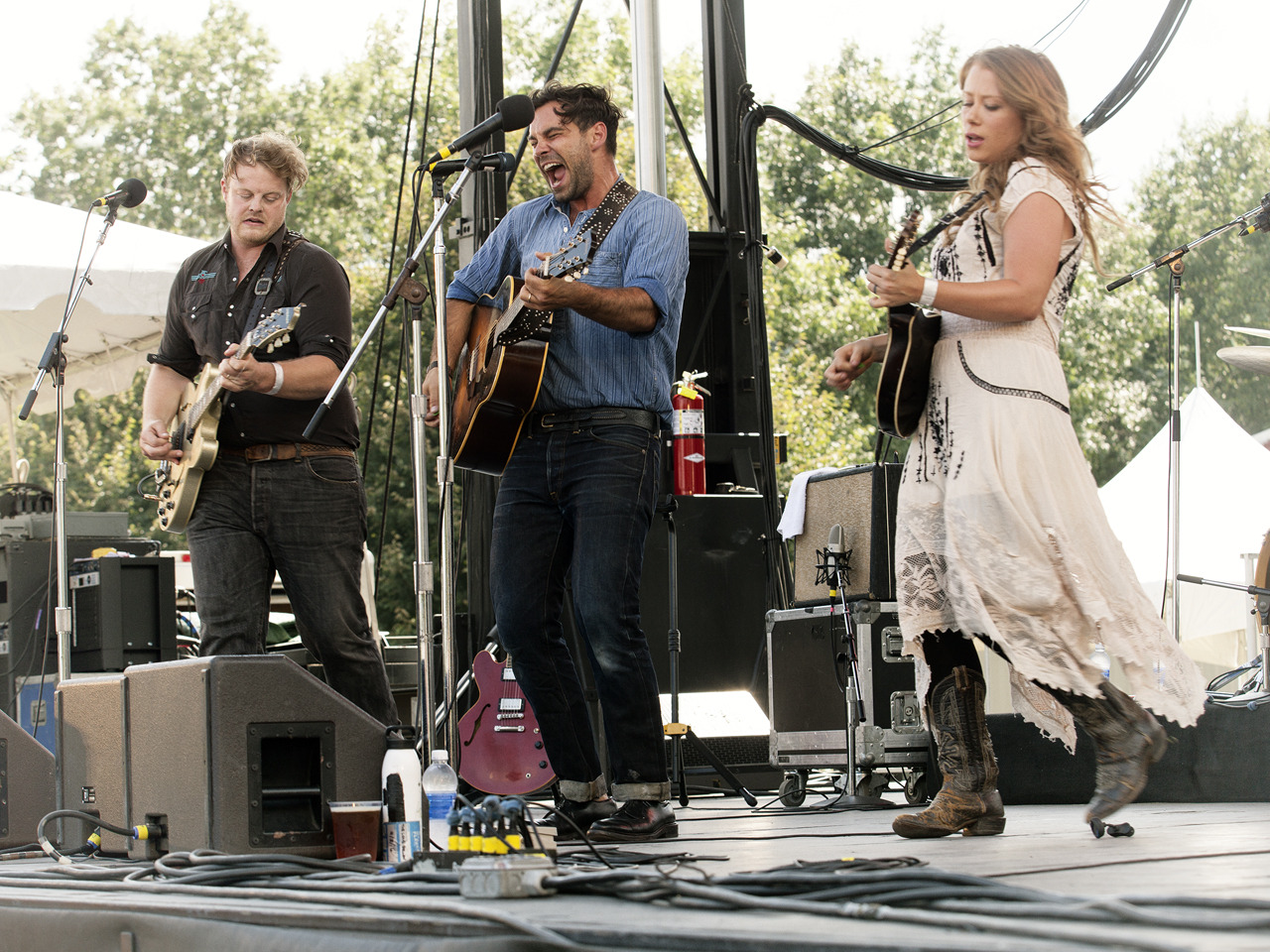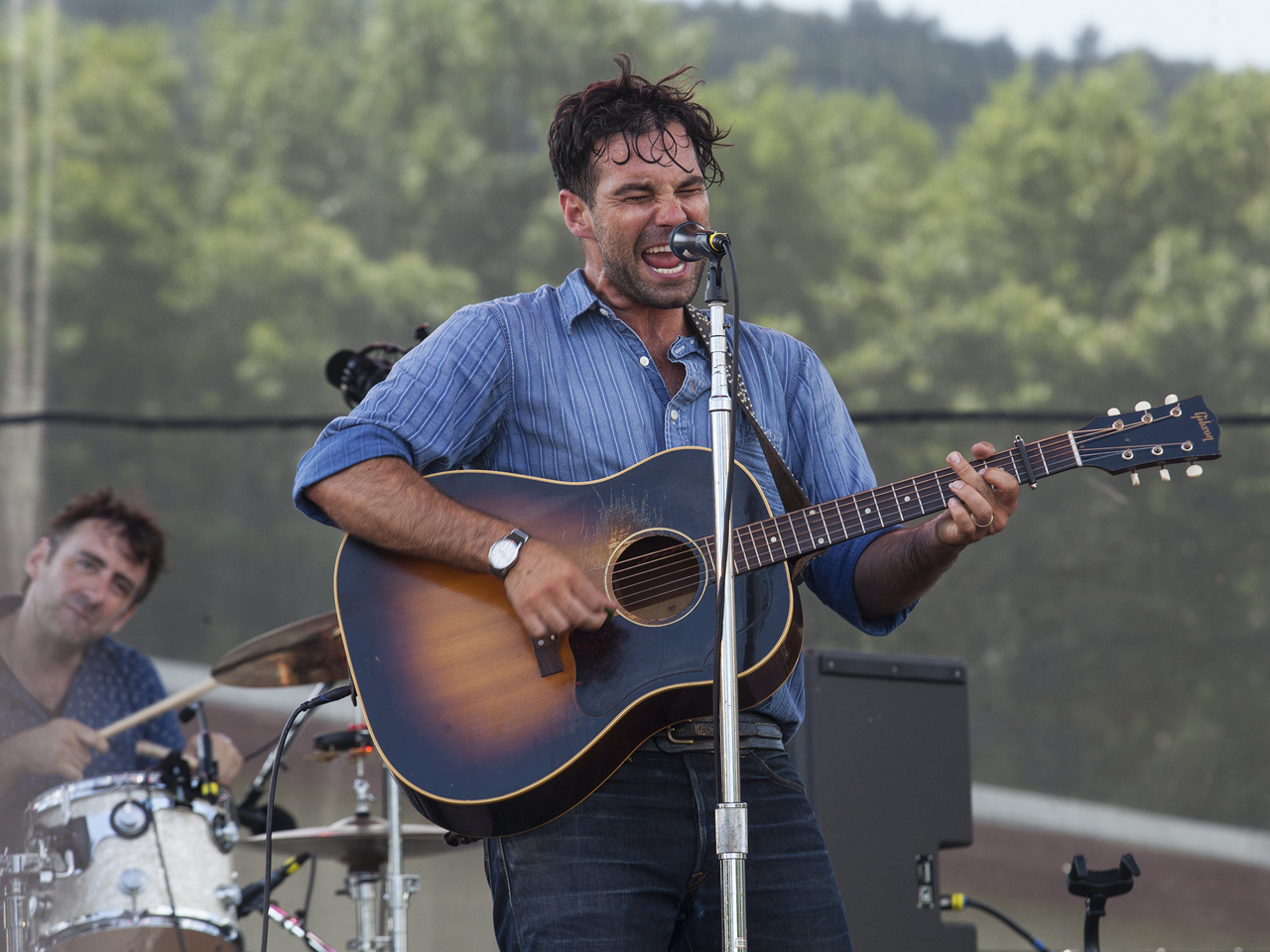The Lone Bellow’s Collective Sentiment

It’s 9 AM on a Monday morning in Brooklyn, NY’s Windsor Terrace neighborhood. The normally bustling area, tucked snugly next to Prospect Park, is eerily quiet as many have deserted the cold weather for the holidays. In an empty coffee shop, however, The Lone Bellow’s Zach Williams is as energized as ever.
The guitarist dishes on a variety of topics as he awaits the arrival of Brian Elmquist—his fellow guitar player in the genre-defying Brooklyn trio—including one of his first jobs cleaning fish on a yacht in Florida, his love of Jim James (“He’s my hero”), The New Basement Tapes (“Marcus [Mumford’s] song on there is so good”) and Monsters Of Folk (“Lit my soul on fire”).
Elmquist soon comes barreling down the narrow hallway. He’s an imposing figure, standing at around 6-foot-4. Elmquist was an offensive lineman at Liberty University in Lynchburg, Va., where he initially met Williams. He caught the music bug at a young age, and he insists he wouldn’t have made it to the NFL anyway. “I was way too small,” he says in his thick Sandersville, Ga., accent.
The burly musician orders what seems like a much-needed cup of coffee. “He’s had a night,” Williams jokes. The two recount their evening out on the town before collecting themselves and diving into their latest project, The Lone Bellow’s highly anticipated sophomore LP, Then Came the Morning, and their travels leading up to this landmark record.
The Lone Bellow’s story, which also includes vocalist and multi- instrumentalist Kanene Pipkin, begins at the aforementioned Liberty University. “They put together a variety night,” Elmquist recalls of the first time he met Williams. “Brian signed up for it. He actually fractured his foot playing football. He shows up to play the talent show and he sings that sweet Edwin McCain song, ‘I’ll Be.’”
“Back then it was real cool,” Elmquist interjects.
“He’s up there on crutches and his guitar breaks, so he just sets it down and this large football player absolutely wails Edwin McCain,” Williams says. “I was like, ‘I have to meet this dude.’” Anyone who has heard Williams’ voice would assume that he’s been singing professionally for his entire life. He is a commanding, emotional and downright dominating vocalist who can reach notes many can only dream of. The inspiration for that actually came with a push from Elmquist at an inopportune time.
“[Zach] was in the shower singing a Train song,” he says, choking on his coffee with laughter.
“‘Drops Of Jupiter!’ Such great stuff,” Williams responds.

“I ripped the curtain open and told him that he should sing in front of people. I scared him to death and left him naked in the shower.”
With the seed planted, the two went their separate ways with Elmquist moving to Nashville, Tenn., to pursue songwriting and Williams moving to West Palm Beach, Fla., with his wife Stacy to go to school.
The future collaborators’ seemingly normal lives would soon turn inexplicably chaotic and traumatic. In September 2004, two hurricanes struck the east coast of Florida just three weeks apart, an anomaly even for one of the country’s most active hurricane areas. The first, Hurricane Frances, achieved a Category 4 rating, causing large-scale evacuations of most of the coastal areas, including West Palm Beach. Seizing the opportunity, Williams, Stacy and several college friends retreated to his parents’ horse ranch in Georgia.
“Weather messes with a horse’s mind—they can feel the pressure,” Williams says.
Williams’ wife Stacy was out riding when a horse acted up and threw her from the saddle, breaking her neck.
“Me and my buddy Caleb find her and it’s just really dramatic,” Williams recounts.
Diagnosed as a quadriplegic, Stacy lived in Atlanta’s Shepherd Center with Williams and several friends for a few months. Through the immense pain and darkness, Williams found a spark of light, something to keep him going in a time of immeasurable hurt. He started writing songs. And with that came a promise.
“All those buddies said, ‘If some miracle happens and Stacy ever walks again, let’s all move to New York City.’”
And then, a miracle happened. Stacy started walking again and made a full recovery. “We’re just really blessed,” Williams says with a fair amount of astonishment in his voice.
With that, the pilgrimage was on. Williams, his wife and several others moved up to New York City in pursuit of their big break. Elmquist would follow a few years later. Williams worked the Brooklyn bar scene for a while, seeking refuge at intimate spots like Rockwood Music Hall and Bar 4. Elmquist, who had his own band at the time, was based out of local hang Dizzy’s Diner before Williams finally decided to take the plunge. “I stopped by there and was like, ‘I know you got your own thing and I got my own thing, but do you want to get together just to have fun?’”
The third piece, Pipkin, was already connected via her brother Mike, who was part of Williams’ support system in the hospital in Atlanta. “When [Mike] got married, he asked me to sing at his wedding,” Williams recalls. “Kanene was living in Beijing at the time and flew over. We sang Aretha Franklin’s ‘Oh Happy Day’ together and it was just like, ‘Holy cow.’”
“She’s the most talented one,” Elmquist confidently states. Not only is she a French culinary chef, but she is also fluent in Mandarin, spent five years in Beijing and lends a crucial dynamic to The Lone Bellow’s sound.
Despite being anchored by Williams, Elmquist and Pipkin, The Lone Bellow’s first rehearsal featured an eight-piece band playing honky-tonk music. Their first show came at the World Café Live in Philadelphia opening up for The Civil Wars. “We were so excited, we just came out guns blazing,” Williams says.
Williams and Elmquist fondly recall a unique exchange with The Civil Wars following their boisterous set. “John Paul White came up to Brian and said, ‘I’m gonna bury you! Why’d you play so loud?’ It was that good, Southern competition,” Elmquist says. “He was pumped up.”
Three months later, The Lone Bellow’s self-titled debut was completed with Civil Wars producer Charlie Peacock. The band turned their newfound sanctuary, Rockwood Music Hall, where Williams played some of his first songs, into a studio and everything clicked.
“We were working on ‘You Can Be All Kinds of Emotional’ and there’s this hard-to-hit harmony, and me, Brian and Kanene hit it together,” Williams recalls. “We didn’t say anything then, but later on, we talked about it and all three of us were like, ‘Alright, we should stop what we’re doing.’”
After quitting their day jobs and jumping on the road, The Lone Bellow’s launchpad came at a familiar spot for most bands—South By Southwest. “It’s basically been nonstop ever since,” Williams says.
Onstage, The Lone Bellow is an impenetrable force. Putting the crowd and themselves through the emotional wringer with their heavy lyrical content, the band is often moved to tears. Williams calls integrating emotionally challenging material into the live show a “contract” between band and audience.
“It’s a handshake between everybody—we’re either all gonna do this together or we’re all not gonna do this together,” he says. “That vulnerability is very intriguing to me, especially when it’s night after night.” He adds, “Wilco said it best. The songs become other people’s songs, other people’s stories, and it’s an incredible honor to have that exchange. These lyrics mean something to you and we’re gonna scream at each other for the next three-and-a-half minutes and it’s gonna be beautiful. It’s a transcendent thing for me.”
For the ever-difficult sophomore LP, the band took a gamble and teamed up with The National’s Aaron Dessner. “We read an interview with Matt [Berninger] and Aaron and said, ‘We like the way these guys talk about their music and how they work with each other,”’ Williams says. “‘We should contact him and see if he’ll make the record.”’
Elmquist, who describes himself as a “huge National fan,” particularly enjoyed the experience. While working for weeks with Dessner to make sure the guitar tones were right, Elmquist says, “I wanted to soak up a lot of [Aaron’s] knowledge. It was a beautiful experience. The guy’s just unbelievable.”
“They worked off each other pretty well,” Williams adds.

Holed up in Dreamland Studios, the band fed off the 200-year- old church located near an abandoned railroad in Woodstock, N.Y. “The gear in there is mind-altering,” Williams says. “We did all the vocals together in the sanctuary. We mic’d the ceilings and floor so you get that natural bleed of our three vocals and I’m excited about that.”
“It was creepy,” Elmquist says of the church.
With the spooky surroundings, the title track offers a brief moment of much-needed hope and clarity for the group. “Even just for our morale as a band, to stay in the dark and start a record in it—we just weren’t prepared emotionally to carry that,” Williams explains. “We were like, ‘Let’s start off fresh and still be honest with ourselves and go down that route.”’
Elmquist further elaborates: “Our writing is real. We’ve gravitated to the songs that are personal, either from our own experiences or friends around us. Our live shows always ended up being a celebration of life, anyway.”
The collaboration also included contributions from Aaron’s brother and fellow National guitarist Bryce Dessner, who came in to add what Elmquist calls “the candy. All the icing on the cake.” Bryce and Pulitzer Prize-winner Caroline Shaw helped arrange brass and strings for most of the record. Williams cites “Telluride,” an emotional tune about a cowboy having to kill his horse, as a standout. “The strings almost create a visual of the night it happened. I just love it,” he says.
One of the album’s signature moments, a patented howl from Williams on the emotional “Marietta,” a song the singer describes as “heavy, unfortunately,” was a product of the aesthetic of making the record in that environment. “Making it in the church absolutely lent to some of those things,” Williams explains.
“The whole experience and the history of the room just seeps itself into the record,” Elmquist confirms. Another standout, “Call To War,” is a personal song penned by Elmquist that he gave to Pipkin to sing. “[‘Call To War’] is a real masculine song. A real chivalrous song. And when a woman is chivalrous and says, ‘I’m gonna take care of you,’ it melts my heart,” he explains.
“It says so much about who he is to give that song to her, some- thing that is so personal to him,” Williams later says.
For an album that Williams calls “our first real, full-band record,” The Lone Bellow didn’t waste any time or opportunities. Armed with their first choice for producer, the band surrounded themselves with as much creative energy as possible, crafting an album that stands up to their critically acclaimed debut and shows a distinct evolution in their sound.
“All of the things that we learned about each other being in a band together and touring weren’t there when we made the first record,” Williams explains. “We just didn’t know each other as well, and now, all of these little idiosyncrasies bleed into how we make each decision for each song and how we care for one another. I think that this record has a lot of that level of connection of the band. We wanted to honor that.”



















